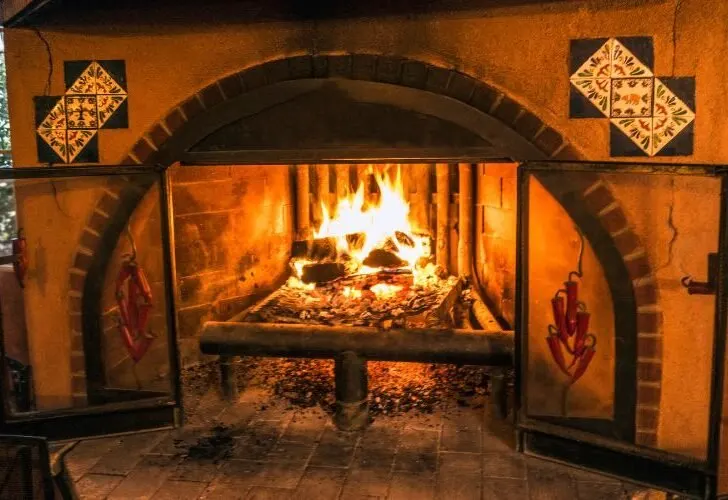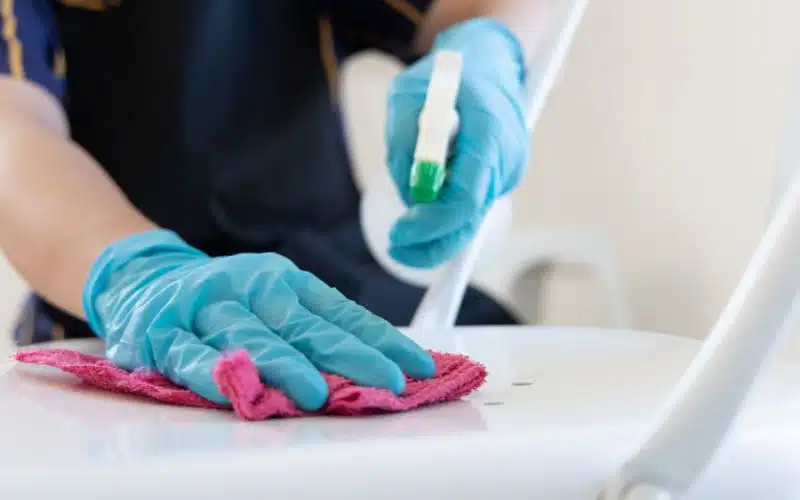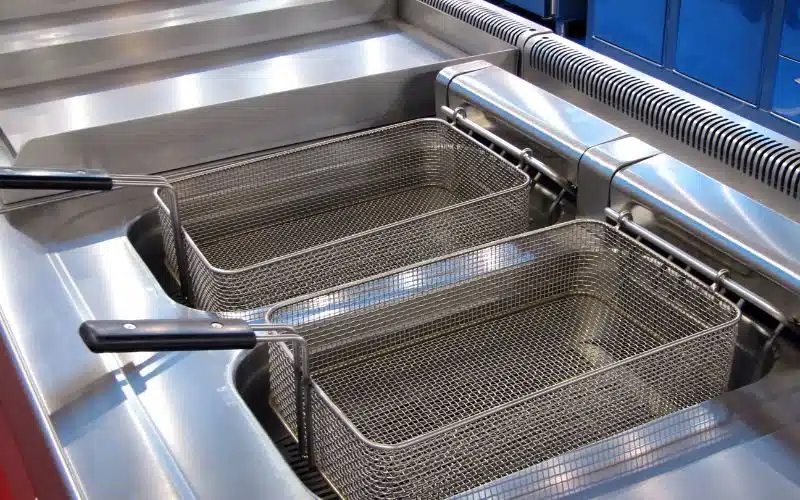When it comes to any fire-related installation in and around the house, it’s ideal to be cautious with its hazards.
For example, before installing a fireplace, research and findings might tell you that fireplaces are safe, and others claim they explode.
However, the negative aspect is always essential for safety; hence, can a fireplace explode?
Yes, a fireplace can explode (gas fireplace specifically), but it’s rare. An explosion happens when gas accumulates due to faulty components like a pilot light and then contacts fire. However, it can only happen when you don’t properly maintain the fireplace.
Can a Gas Fireplace Explode?

Yes, a gas fireplace can explode due to negligence, lack of proper maintenance, or accidents.
For example, an explosion will occur when there’s a gas leak or improper gas switch-off that causes the gas to accumulate.
And when you try lighting the fireplace up, the action will cause an explosion. Nevertheless, a gas fireplace is the safest and most reliable type of fireplace nowadays.
Most cases of a gas fireplace are due to a component malfunction and manufacturing defect. Also, for some reasons, like low-quality components, they degrade fast and fail.
A gas fireplace has many components that make it easy to use a fireplace, and they control the flow/supply of gas.
However, any defect will let the gas out and build up, even up to the venting system. And when turning the fireplace on, it explodes and destroys the vent system and the entire fireplace.
However, most of these components are to serve a long time. And if you practice good maintenance of the fireplace, you may notice such failing components.
So it’s always beneficial if you are more sensitive to situations around you to avoid possible accidents.
Can a Wood Fireplace Explode?
It’s rare and almost impossible for a wood fireplace to explode unless you introduce an explosive material.
The common hazard you can experience in a wood fireplace is a blazing chimney due to the buildup of creosote and other substances.
However, the buildup of creosote can set the fireplace on fire but not explode. There can only be some popping sounds from certain firewoods when burning, but they won’t explode.
However, when you use logs that are still wet or containing resins, you will hear these popping sounds.
And when the combustion of the firewood is low, the moisture may steam, and a similar action like explosion happens, but it’s rare.
Above all, wood is not explosive, especially the type we use for fireplaces and other commercial purposes.
Manufacturers thoroughly test fireplace wood to be safe so there are no chances of exploding.
What Causes a Fireplace to Explode?
Many things can cause a fireplace to explode, either some chemical reaction or fault from you.
But the primary cause is the buildup of toxic substances which react to a fire causing an explosion.
When you have a large volume of gas accumulation before lighting the fireplace, it will cause an explosion.
However, the causes still connect to faulty components, which allows the gas to accumulate over time.
So let’s see some of these components and possible causes of a fireplace explosion:
- Faulty pilot light
- Low gas pressure
- The safety valve is not off correctly.
- Poor ventilation system
- Thermal expansion of glass fronts
#1. Faulty Pilot Light
A gas fireplace has a pilot light ( ignition flame) for igniting a fireplace. Suppose the ignitor is faulty, and the alignment is wrong; it may cause an explosion.
The pilot light works by sending a signal to allow gas flow, and then the flame ignites immediately.
But when the ignition fails, or the flame weakens, gas can build up in the fireplace system. And when the ignition finally switches on, the gas buildup reacts and explodes.
Faulty pilot light is the most common cause of fireplace explosion, which is why it’s good to confirm the pilot light is off after usage.
#2. Low Gas Pressure
The amount of gas that passes through your burner is also a factor that causes an explosion.
When the gas pressure is low, there’s a tendency for the primary air to be high. However, the manufacturers sometimes provide the ideal pressure.
#3. The Safety Valve Is Not off Correctly
The safety valve is to regulate and help the pilot light and the supply of gas. The safety valve minimizes and regulates the amount of gas going to the pilot light.
However, the valve is one significant safety component for a fireplace. But when it’s faulty and still on, it will allow a gas buildup in the fireplace.
The gas supply is still on when you fail to close the gas safety valve completely. And when you try to light the fireplace again, an explosion occurs.
However, there are more cases of opening a safety valve and refusing to close it, which is hard to notice.
A technician is reliable in fixing this type of problem, so endeavor to fix it quickly when you notice it.
#4. Poor Ventilation System
The primary purpose of a vent system or a chimney is to get rid of dangerous substances and correctly assist a fire burning.
For a gas fireplace, a blockage in the vents will cause the place to explode. Meanwhile, a poor design of ventilation is also a contributing factor here.
According to some research on fireplace explosion, gas fireplaces, in specific, lack good designs.
However, not everybody knows a proper fireplace design, so employing an expert is advisable.
Capacity (CuFt) = Height (ft)×Width (ft) ×Depth (ft)
=4×3×2
=24CuFt
#5. Thermal Expansion Exploding Fireplace Glass Door
When you close the front of your fireplace when the fire is burning, the glass will shatter after some time.
The explosion will happen if you expose the glass to more heat of about 600 degrees. However, touching or hitting the glass door can trigger this glass explosion.
Glass fronts are familiar with most modern fireplaces, especially a gas fuel type, as it adds to the decorations of the house.
However, tempered glass is what many people use because of its resistance, and some are pyro ceramic materials.
There have been many reports on having a gas fireplace glass front exploding.
And it is one lousy occurrence because when this glass shatters into big or tiny pieces, it can cause severe damage to anyone around.
So the shattering of the glass front is also a significant type of explosive occurrence.
Can a Fireplace Cause a House Fire?
Yes, a fireplace can cause a house fire. Apart from a fireplace exploding, leaving a gas fireplace overnight might emit carbon monoxide gas.
When the gas takes over the whole house, any fire spark can cause a massive fire or an explosion.
Also, burning wood or gas can emit carbon monoxide or other substances harmful to humans. Excessive inhalation of such substances can cause health issues that can lead to death.
However, some gas fireplaces have a glass cover design to avoid such situations. Now let’s look at a comparison between a gas fuel and a wood fireplace in the table below:
| A Gas Fireplace | A Wood Fireplace |
|---|---|
| It supports a vent-free installation. | It requires a ventilation system. |
| Cost less and easy to install ( up to $8,000) | It costs more and is hard to install ( up to $20,000) |
| It needs a gas supply connection | It does not require a gas supply connection |
| It’s easy to light up | It takes more time to light up |
| It has a modern appearance | It has a traditional aesthetic appearance |
| It does not produce smoke | It produces smoke |
How Common Are Fireplace Explosions?
More than 10,000 cases of fire breakout in houses yearly are from fireplace explosions. However, a gas fireplace explosion is the most common type of fireplace explosion.
Research shows that most causes of problems in a fireplace are due to a gas leak and bad design. However, there are now modern fireplace designs to minimize fireplace explosion cases.
So there will be fewer fireplace hazards, and the rate will reduce drastically. Also, a fireplace has more than 15 years of warranty if you maintain and use it properly.
How Do I Prevent a Fireplace Explosion?
Most fire hazards, such as explosions, resulting from negligence or improper usage.
However, with proper maintenance of your fireplace, it will last and serve you longer. So to keep your fireplace, home, and family safe, you can follow some of these preventive measures:
#1. Proper Maintenance
An expert survey is one safety measure to prevent fireplace explosion with any fuel type fireplace.
It would help if you got an experienced fireplace technician to inspect and organize cleaning maintenance for your fireplace.
However, most fireplace explosions somehow relate to a lack of maintenance. Many components need maintenance, but one crucial component needs more, which is the pilot light.
Therefore, aside from the inspection and maintenance a professional offers, you should plan a regular inspection and maintenance of the pilot light.
#2. Proper ventilation
Ventilations are meant for safety, especially to let out toxins from your house. However, it’s true chimneys serve safety purposes, but it’s not 100% safe; the house needs protection from general fire outbreaks/explosions.
Moreover, most houses today don’t have a fireplace chimney, and as such, they make use of a gas fireplace.
So, for this reason, house ventilation is essential to let out gas or any toxic substance. However, other preventive measures include:
- A building or installing adequate barriers for flames and heat against other materials in the house.
- Always open the damper for some time before you light the fireplace. It will prevent gas or toxins accumulation.
- Keep all flammable materials away from the fireplace.
Last but not least, you can prevent a fireplace explosion by installing an affordable smoke/carbon monoxide detector alarm from amazon.
No products found.
The detector works like an alarm; it will alert by beeping when there is excess smoke or carbon monoxide in the house.
Can a Chimney Explode?
A chimney is more likely to catch fire for a wood fireplace when some compounds like creosote and soot build up there.
However, substances like soot and creosote are natural with wood burning. But when the creosote gets thicker, and you don’t clean up the buildup over time, they get disastrous.
You are to carry out an inspection and cleaning of your chimney at least once a year. It can be during a general cleanup in the house or in late summer, awaiting the fall.
Importantly, if you use it more regularly and you find creosote or soot building up more, you should do it more often yearly.
You can inspect the chimney to see if there are blockages or creosote buildup and then purchase some cleaning equipment for the job.
However, it’s not an easy task to do the inspection and cleaning, so it’s advisable to contact a professional chimney sweep.
Capacity (CuFt) = Height (ft)×Width (ft) ×Depth (ft)
=4×3×2
=24CuFt
However, a gas fireplace with a chimney is not an exception to starting a fire up at the chimney.
Even though gas doesn’t produce creosote up in the chimney, there can be a blockage there that can start up a fire.
There are many causes of chimney blockage, including debris from tall trees, small animals’ nests, etc.
However, if you are cautious enough, you might notice the symptoms of a chimney blockage. The symptoms include:
Falling debris on the fireplace base,
- Excess smoke in the fireplace area,
- Water leakage, and a host of others.
Conclusion
A fireplace is undoubtedly safe inside the house because its design avoids fire hazards and creates warmth.
However, as safe as the fireplace might be, regular maintenance is key to eliminating or reducing the chances of having fireplace explosions.
Apart from the maintenance, you should have a technician to help you inspect and fix problems.





